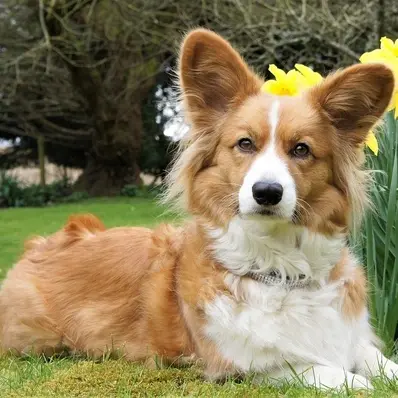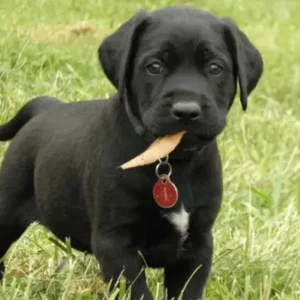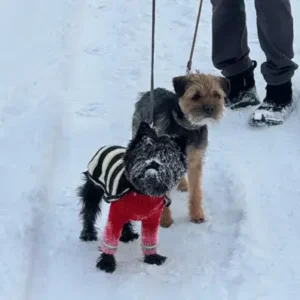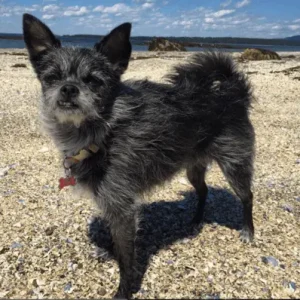Cardigan Welsh Corgi Origin
The tough yet handsome Cardigan Welsh Corgi gets its name from the medieval kingdom of Cardiganshire, Wales, and is the older of the two AKC corgi breeds. It’s also one of the oldest British breeds. The word “corgi,” originally “kergie,” comes from the ancient Celtic word for “dwarf dog.”
Historians believe corgis were brought to Wales by the Celts over 3,000 years ago, and they’ve been driving Welsh herds for at least 1,000 years.
Cardigans have short legs, making them perfect for nipping at cattle’s heels while staying low to avoid kicks. Known as “heelers,” they drove cattle during the day and guarded flocks at night.
Over time, they became all-purpose farm dogs, hunting partners, family protectors, and athletes. British crofters, or tenant farmers, relied on these hardworking dogs to survive on the land granted to them by the crown.
Cardigan Welsh Corgi Club- Source: AKC.org
At one point, Cardigans and Pembrokes were interbred and considered a single breed in the UK until 1934. The first pair of Cardigans arrived in the U.S. in 1931, and the AKC recognized them under Herding Group in 1935.
Cardigan Welsh Corgi Personality
The Cardigan Welsh Corgi is one of the dog breeds that is loyal, intelligent, and adaptable companion known for its affectionate and playful nature. With a strong sense of duty rooted in its herding dog heritage, the breed is both alert and attentive, making it an excellent family dog.
- Cardigan Welsh Corgi Temperament
Cardigans are deeply bonded to their families, and their intelligence makes them highly trainable and eager to please. They enjoy being active and thrive in environments where they can engage in both physical and mental activities. Their loving and sturdy personality makes them wonderful companions for children.
- Potential Challenges
The Cardigan Welsh Corgi, while intelligent and loyal, can present some challenges for owners. Their herding instincts may lead to heel-nipping and frequent barking if not properly managed. Early socialization is essential, as they can be territorial or reserved with strangers.
Their independent nature can make training a bit tricky, as they sometimes prefer to follow their lead. Additionally, Cardigans need plenty of mental stimulation to stay happy and well-behaved. Without enough mental challenges, they may become bored and develop stubborn or unwanted behaviors.
Cardigan Welsh Corgi Physical Appearance
The Cardigan Welsh Corgi is a small, low-set dog with a long body that sits close to the ground. It has large, slightly rounded, triangular ears and a broad head that narrows into a pointed nose. Their bright, lively eyes reflect intelligence and energy.
- Size
These purebred dogs stands at a height of 10.5 to 12.5 inches at the shoulder and the Cardigan Welsh Corgi weight is between 25 to 38 pounds. Despite their small stature, their long, low-set body gives them a sturdy and balanced appearance, perfect for their herding background.
- Coat color
The Cardigan Welsh Corgi’s coat comes in various colors, including all shades of red, sable, and brindle, as well as black and blue merle. They typically have white markings on their legs, chest, neck, muzzle, belly, and tail tip, and may have a white blaze on their head.
The coat length can vary across their body. Some Cardigans have soft, fluffy coats, but these are not ideal since they don’t protect the dog from the weather. Many Cardigans also have a distinctive marking called a “fairy saddle” on their back, named after the legend that fairies rode these dogs in Wales.
Fawn and Black Cardigan Welsh Corgi- Source: Pixabay
Fawn and White Cardigan Welsh Corgi- Source: Pixabay
Brindle Cardigan Welsh Corgi- Source: AKC.org
Blue Merle Cardigan Welsh Corgi- Source: corgi__cardigan
Cardigan Welsh Corgi Gender Differences
- Size
The average shoulder height for a male Cardigan Welsh Corgi is 10.5 to 12.5 inches, with a weight ranging from 30 to 38 pounds. Females are generally smaller, weighing around 25 to 34 pounds.
- Temperament
Male Corgis are active and social, often full of energy and barking at even the silliest things. They are protective and loyal, typically described as bold and eager, and enjoy outdoor activities with their owners.
In contrast, female Corgis are calmer and more affectionate. They tend to be independent but love to cuddle and get along well with children and young puppies. While they bark less than males, they are equally eager to please and protect their families.
Cardigan Welsh Corgi Feed/Nutrition
Feed your Cardigan Welsh Corgi 1 to 1.5 cups of high-quality dry food each day, split into two meals. The amount your adult dog requires will vary based on factors such as size, years of age, build, metabolism, and activity level. Just like people, dogs are individuals, so their food needs may differ.
A highly active dog will naturally need more food than a less active one. Additionally, the quality of the dog food matters; better quality food provides more nutrition, allowing you to feed less. Broccoli can be offered as a healthy snack in moderation, but be sure to serve it plain and in small pieces to avoid digestive issues.
Cardigans enjoy eating and can easily overindulge, so it’s important to measure their portions and feed them twice a day in small packages instead of leaving food out all the time.
Cardigan Welsh Corgi Health
Cardigan Welsh Corgis are generally healthy, but like all breeds, they can be susceptible to certain health issues. While not every Cardigan will experience these conditions, it’s essential to be informed if you’re considering this breed.
- Intervertebral Disc Disease IVDD: Due to their long backs, Cardigans are at risk of ruptured spinal discs, which can cause significant discomfort. Signs of this condition may include unsteadiness, difficulty navigating stairs or furniture, limb knuckling, weakness, and even paralysis. To help prevent this disease, ensure your dog maintains a healthy weight, avoid excessive jumping, and provide support when they climb stairs or navigate furniture.
- Progressive Retinal Atrophy: This is a group of eye diseases that lead to the gradual degeneration of the retina. Initially, affected dogs may experience night blindness, with vision loss occurring during the day as the disease progresses. While there is no cure, keeping your dog’s environment consistent and minimizing sudden changes can help them adapt to their limited or lost vision. Regular veterinary check-ups can also assist in the early detection and management of this condition.
- Hip Dysplasia: Hip dysplasia is a genetic condition where the hip joint doesn’t fit properly in the socket, leading to pain and arthritis. Symptoms can include difficulty rising, decreased activity, limping, and reluctance to jump or climb stairs. To help prevent hip dysplasia, choose a reputable breeder who screens for this condition and maintains your dog’s healthy weight.
Cardigan Welsh Corgi Care and Grooming
The Cardigan Welsh Corgi is a herding breed designed for moving flocks and requires daily exercise, such as walks or agility training. He thrives in various living environments, from city condos to country estates.
Due to his short legs and long back, the Cardigan is prone to back injuries. Protect puppies by preventing them from jumping on or off furniture and always support their legs when picking them up.
Though his weather-resistant coat suits harsh climates, the Cardigan should not be left outside. This social breed craves human interaction.
Regular brushing is essential to manage shedding, especially during heavy shedding seasons. To maintain oral hygiene, brush your Cardigan’s teeth two to three times a week, and trim nails once or twice a month. Check ears weekly for signs of infection and clean them gently.
Start grooming as a puppy to make it a positive experience, and inspect for any sores, rashes, or signs of infection. Regular check-ups help catch potential health issues early. Additionally, training your dog not to bite is crucial; use positive reinforcement and redirect biting behavior with appropriate chew toys.
Cardigan Welsh Corgi Adoption
Rescuing a Cardigan Welsh Corgi can be a rewarding experience, as many dogs in shelters need loving homes. Adopting from a rescue not only gives a Corgi a second chance at life but also helps alleviate overcrowding in shelters. By choosing to rescue, you gain a loyal companion while making a positive impact on the community.
Cardigan Welsh Corgi Price
The price of a Cardigan Welsh Corgi typically ranges from $1,500 to $2,500, depending on factors such as breeder reputation, pedigree, and location.
When considering purchasing a Cardigan Welsh Corgi, it’s essential to choose a reputable breeder who prioritizes health and temperament. A responsible breeder will provide health clearances and ensure that puppies are well-socialized before they go to their new homes.
Interesting Facts
- Queen Elizabeth II has been fond of Cardigan Welsh Corgi.
Queen Elizabeth II – Source: Buzz Feed News
- Martha Stewart has owned Cardigan Welsh Corgi as her pet.
Martha Stewart with her dogs- Source: Pinterest
- They have been featured in performance events such as Breed Judging Show 2024.
Best For
The Cardigan Welsh Corgi is an excellent pet for active individuals or families who can provide regular exercise and mental stimulation. They thrive in environments where they can engage in activities like walks, playtime, or dog sports. Their friendly and loyal nature makes them a great companion for those who appreciate a loving, interactive dog that enjoys being part of the family.
Top Names
| Male Cardigan Welsh Corgi Names | Female Cardigan Welsh Corgi Names |
| Cooper | Bella |
| Finn | Daisy |
| Max | Ruby |
| Oliver | Sadie |
| Winston | Zoey |









 Cardigan Welsh Corgi Club- Source:
Cardigan Welsh Corgi Club- Source: 

 Fawn and Black Cardigan Welsh Corgi- Source:
Fawn and Black Cardigan Welsh Corgi- Source:  Fawn and White Cardigan Welsh Corgi- Source:
Fawn and White Cardigan Welsh Corgi- Source:  Brindle Cardigan Welsh Corgi- Source:
Brindle Cardigan Welsh Corgi- Source:  Blue Merle Cardigan Welsh Corgi- Source:
Blue Merle Cardigan Welsh Corgi- Source: 
 Queen Elizabeth II – Source:
Queen Elizabeth II – Source:  Martha Stewart with her dogs- Source:
Martha Stewart with her dogs- Source: 






